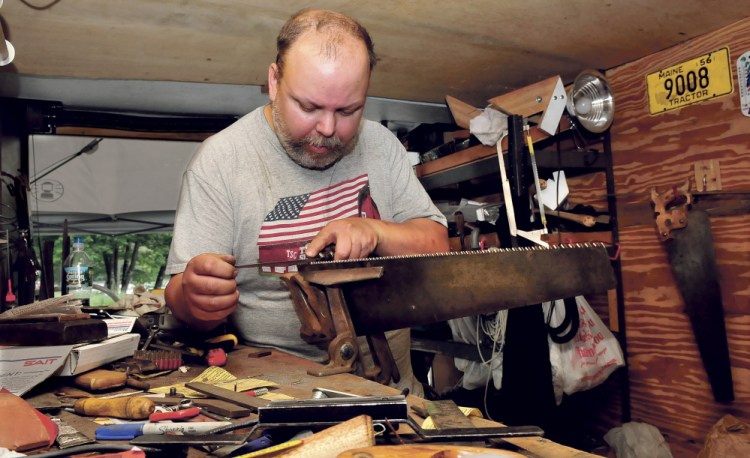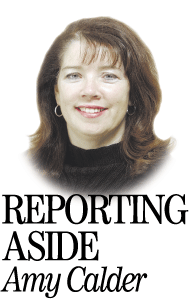Vern Burke places two freshly sharpened axes on the ramp of his cargo trailer parked just east of the Great Eddy of the Kennebec River in Skowhegan.
“That one right there is a Dunn, which they made between 1879 and 1921,” he says of one of the axes. “That other one is a Spiller from about 1940. They were made in Oakland, along the Messalonskee Stream. These are the old high-carbon steel heads. The problem you find with tools today, especially everything that comes from the Far East, is that they’re stainless steel. Stainless makes a lousy steel. They don’t take or keep the edges that this kind of steel does. Most of the stainless steel is made from recycled steel. I like to tell people we send China our junk and they send us back junky tools. This was the good-quality steel. You cannot buy tools like this anymore. Even the good axes made today will not measure up to this. As you can tell, I’m a great proponent of ‘buy American.’ ”
Burke, 48, owns Swiftwater Edge Tool Works, a mobile tool sharpening business he started about five years ago after his great-uncle Percy died at 100 and he inherited his tool collection.
From the time he was a toddler, Burke had regularly visited the family farm in Washington County where Percy lived and watched his great-uncle sharpen and restore old tools. He loved and was fascinated by the work.
“What I’m doing here is what he did most of his life. I fell heir to his tools. I’ve got his vises; I’ve got his specialty tools, gages and things. These are pretty near as old as he was. I’ve also got my great-grandfather’s blacksmith anvil that I use.”
Operating in the 17-by-16-foot trailer he hauls around with his gray Ford Ranger pickup, Burke sharpens knives, saws, scissors, woodworking tools and farm, commercial and industrial tools, including those big old 30-inch saws farmers haul behind tractors.
About the only things he does not sharpen are complicated milling machine bits.
“Some of those things are so complicated that they require computer-controlled equipment to grind them accurately. I sharpen just about everything. If you can name it, I can probably sharpen it. I do all the modern stuff, but I also do all the old things. I’ve always loved old tools. As a kid, I bugged the devil out of my father, getting him to tell me what the old tools in the museum were. We’d go through the museum at the Fryeburg Fair.”
A stocky man with a gray beard and brown hair, Burke is talkative, friendly, upbeat — and well versed in everything tool-related.
His business is based in Skowhegan, where he lives, but he puts about 600 miles a week on his truck, traveling to clients and parking in places that draw business.
“Mondays I’m in Norridgewock, Tuesdays I’m here in Skowhegan — Tuesday at Tractor Supply and Wednesday here. I take Thursdays and Fridays off the road. Saturdays I’m down in Arundel and Sundays I’m over in Fryeburg. I can have some awfully long days. Usually on a day like this, I’m here at 8:30 in the morning until 6 o’clock at night; but my last day over to Fryeburg, I didn’t get back to the house until 10 o’clock.”
Burke says he loves his work, which is a departure from the computer, Internet and network engineering work he did for many years after graduating from Skowhegan Area High School in 1983 and attending a trade and technical school.
He always did a bit of tool work on the side, but when the economy tanked, he decided to do it full time, he said.
“One of the things I learned is that I’m a lot happier being my own boss. Having the business has got its headaches, but I’m out here in good weather, fresh air, bright sun. I see a lot of people. I pretty much have a dedicated following wherever I go. If it hadn’t been for the economic crash, I might not have gotten started in this. I’m glad I did. The sharpening work I do is what pays the bills, but what I really enjoy more than anything else is the old tool restoration I do. I recover the old quality American name-brand tools and restore them so that they’re back in good working, useful condition. In some cases, they work better than when they were new.”
As cars and trucks rush by on busy U.S. Route 2 East, a red pickup stops and 69-year-old Skip Hodgdon of East Madison steps out. Burke retrieves a package of planer blades he has sharpened for Hodgdon.
“He’s very efficient,” Hodgdon says of Burke’s work. “And he gets it done quickly, and I’m very satisfied with his service.”
Hodgdon says he does not know where he would take his blades to be sharpened if Burke were not around.
“There’s a guy up in New Portland that used to do it, but it’s just so convenient for me here. I dropped them off yesterday and I picked them up today.”
Another truck stops and Mark Frazier, owner of Fraz Landscaping & Design, emerges with a hedge trimmer he needs sharpened. Burke tells him he can have it ready for him in a couple of hours at a cost of $8.
“He does a very good job,” said Frazier, 53. “There’s no place around that I know of that sharpens tools and hedge trimmers, and the price is reasonable.”
Burke says he sharpens pruners for Backyard Farms, a tomato production plant in Madison. He also sharpens crosscut saws for U.S. Forest Service workers who use them to clear trails in national parks and forests because they are not allowed to use chain saws. The Forest Service in Colorado is using a half dozen of his two-man crosscut blades to fight fires in remote areas where it is difficult to refuel chain saws, he said.
“I have people ship them to me to work on,” he said. “I’ve done competition saws for the Colby College Woodsmen Team. I’ve sharpened crosscut saws for half the states in the country and southern Canada. I sent four double-bit axes to Australia.”
Burke, whose mother was a schoolteacher and whose father was a telephone company worker, is a bachelor.
“I’m married to my work,” he says, smiling.
He never knows from day to day what he’ll be sharpening. Recently, he worked at the New England Paint Horse Club Show at the Skowhegan State Fairgrounds, sharpening clipper heads used for clipping horses for show. A woman who operated the concession cart there asked him to sharpen her spatula so she could slice rolls more easily. He did it, and she was pleased with his work, he said.
“Last summer, I was sitting out here and a car with New York license plates stopped. The people had a cordwood saw blade that they hand-carried over from eastern New York because they couldn’t find anybody there to sharpen it. They found me via my website.”
Amy Calder has been a Morning Sentinel reporter 26 years. Her column appears here Mondays. She may be reached at acalder@centralmaine.com
Send questions/comments to the editors.




Comments are no longer available on this story